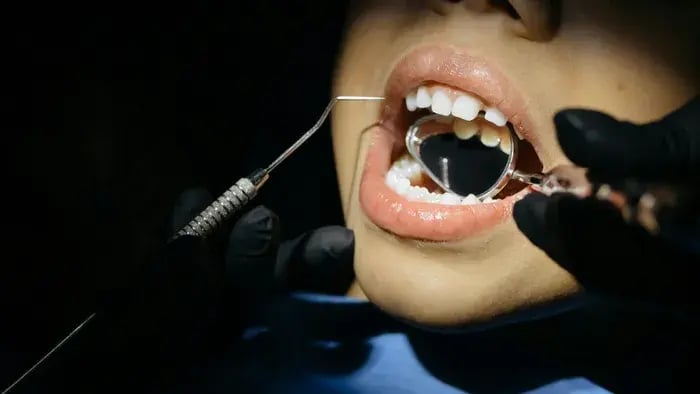Introduction
Teeth grinding can be defined as a condition in which a person clenches and rubs their teeth with one another, usually during this sleep. Continuous teeth grinding may lead to damaged teeth and even cause jaw tiredness in the long run. As per the Journal of Neuroscience in Rural Practice published in 2015, in some cases where the intensity is very high, teeth grinding may also lead to disturbed sleep and headaches.
Although teeth grinding can happen at any time during the day, among kids, it may generally happen during nighttime. The other name for this condition is bruxism. As compared to young adults, this condition can be more common among kids and adolescents. If you feel that your child is going through a similar problem, then here is a deeper look into it to understand its causes, symptoms, and how you may cure this condition.
Common Causes of Teeth Grinding

Here is a look at some of the most common causes of teeth grinding among kids.
-
Emotional Stress and Anxiety
A child who is going through some kind of emotional distress or is having anxious thoughts may experience teeth grinding subconsciously. It can be a defense mechanism of the body to tackle anxious thoughts and regulate one's emotions.
-
Misaligned Teeth
In some cases, the shape of the teeth can be an underlying problem behind the continuous grinding of the teeth. Because of lack of alignment, the teeth might not be able to settle properly during nighttime. A child who also bites the food abnormally can also experience a similar problem.
-
Teething Ache
Young kids, whose milk teeth have just fallen and are going through a teething process may also face a similar discomfort. Due to the growth of permanent teeth in the jaw, a child may experience severe pain during sleep time, which may make them grind their teeth involuntarily.
-
Medications
Consumption of certain kinds of medication, particularly the ones that may affect the nervous system can also lead to a similar problem. Additionally, taking a particular type of medication for one's gums and teeth can also affect the moment of teeth.
-
Hyperactivity Disorder
A child who generally has trouble staying calm and stable in a place may also experience a similar problem. With hyperactive kids, continuous movements during the daytime can lead to the development of a habit of moving various parts of the body even during sleep.
-
Learned Behavior
Sometimes, teeth grinding can be an acquired behavioral pattern that the child might have picked up subconsciously from someone else. In such a scenario, the child doesn't realize this, but in a way, teeth grinding becomes a conscious habit over time.
Symptoms
To analyze early signs of teeth grinding in the longer run, parents can keep certain habits of their child in check to ensure that the child doesn't develop a prolonged habit that is hard to cure in the longer run.
-
Dental Damages
If your child has some kind of dental damage, such as a broken tooth or a damaged enamel then your child might face this problem in the longer run. Additionally, kids who have highly sensitive teeth may also face a similar issue.
-
Pain in the Jaw
Perpetual pain in the jaw can also be one of the symptoms of teeth grinding in the long run. Some children might have a joint disorder that may create a problem in the perfect alignment of teeth. In such a scenario, the child might be continuously shifting their tooth position during nighttime.
-
Erratic Sleep Patterns
A child who experiences disturbed sleep may also encounter the problem of teeth grinding in the long run. To avoid any dental issues during the night, the child must sleep peacefully and without any disturbance. On the other hand, a child whose sleep remains disturbed throughout the nighttime may also involuntarily develop this habit.
-
Behavioral Issues
Behavioral issues among kids, such as volatile temper are also one of the initial symptoms of developing a prolonged condition of teeth grinding. In some cases when a child might feel angry or distressed, they might start grinding or putting a lot of pressure on their teeth which may deplete their dental health.
Effective Strategies to Tackle Teeth Grinding
Here are some of the few strategies that can help a child tackle the problem of teeth grinding.
-
Stress Management
For kids who have behavioral issues, parents may help them manage their emotions and regulate stress through counseling or relaxation techniques. Under the guidance of professional help, parents may encourage the child to take part in such mindful activities that may help them remain calmer and more composed.
-
Positive Reinforcement
When a child has developed a prolonged habit of grinding their teeth, continued support from parents becomes necessary to get rid of such habits. In such a scenario, parents may create a positive environment and say words of appreciation to the child for trying their level best. Additionally, if the child is successfully able to control themselves for even a particular amount of time, parents may give them a small token of appreciation.
-
Professional Help
In a scenario where you feel that your child has some underlying medical condition such as jaw problems, then it's always better to reach out to a medical professional. Even in the case of hyperactivity disorder, a child's doctor may provide some substantial advice and tips to get rid of the problem. Medical professionals can also advise certain medicines if needed to treat the problem permanently.
Conclusion
Maintaining optimal dental health ensures that children can enjoy eating whatever they like, and they do not face any dental risks in the long run. By paying attention to small habits, parents can ensure that the child remains fit and gets rid of any kind of dental problems that they might be facing.
References
https://pmc.ncbi.nlm.nih.gov/articles/PMC8471284/